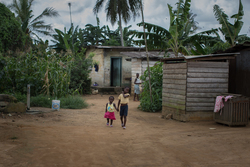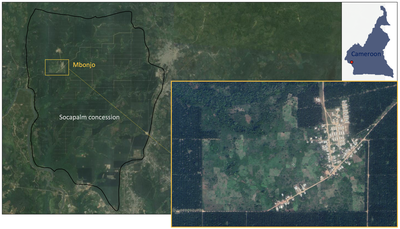Mongabay | 26 June 2020 [FR]
‘If they take our lands, we’ll be dead’: Cameroon village battles palm oil giant
By Victoria Schneider
By Victoria Schneider
-
Mbonjo sits in the heart of Cameroon’s country’s largest oil palm and rubber-producing region. In 2000, state-owned oil palm plantations around the village were acquired by Société Financière des Caoutchoucs (Socfin), a Belgian holding company that operates palm oil and rubber plantations through dozens of subsidiaries across Africa and Southeast Asia. Today, the company owns some 58,000 hectares of oil palm and rubber plantations in the region, which are managed Socfin’s local subsidiary Socapalm.
-
In 2012, Socapalm attempted to expand the plantation into new areas. However, efforts to do so were met with opposition from the community, according to local residents who said they were living in the places the company wanted to take over.
- Socapalm ultimately withdrew from the area. But the fear that someday the company will return and try again to take their land persists in Mbonjo as issues surrounding the concession boundaries have remained unresolved. NGOs who have visited Mbonjo have documented several problems with the plantation operations, including unresolved issues surrounding land rights, poor housing conditions for workers and a low integration of the local population into the workforce.
-
Socfin CEO Luc Boedt refutes claims that Socfin has harmed communities, saying instead that the company has helped them by training residents in modern agriculture practices, supplying nutrients to improve soil fertility, ensuring the availability of water and electricity, providing opportunities for education and jobs, and creating a market for smallholder crops.
The first time Emmanuel Elong wrote a letter to Vincent Bolloré was in 2013.
“The impact of the group that you are controlling on our lives is immense,” he wrote. “And because we have never had any contact with the representatives of this group, Socfin, we are reaching out to you to help us solve this.”
Elong, a 51-year-old farmer from a tiny village in Cameroon called Mbonjo, decided to bring his grievances to the table of one of France’s most influential businessmen, Vincent Bolloré, CEO of the French multinational Bolloré and ranked 451 on the Forbes billionaires list. Bolloré is active in logistics, plastic production, media, telecommunications, advertising and tropical plantations in West Africa. The Groupe Bolloré is a key shareholder of Belgian multinational Socfin (holding 38.75 %), which owns rubber and oil palm plantations in West Africa and South East Asia. In Cameroon, Socfin leased about 78,400 hectares of land from the Cameroonian government.
An attempted takeover
Mbonjo sits in the heart of the country’s largest oil palm and rubber-producing region, an island of tin-roofed huts surrounded on all sides by thousands of oil palm trees reaching 15 meters into the blue Cameroonian sky. The formerly state-owned operation was acquired by Socfin in 2000. Today, the company owns some 58,000 hectares of oil palm and rubber plantations in the region, which are managed Socfin’s local subsidiary Socapalm.
Sandy roads lead from the highway through the monoculture plantations to the enclave where Elong’s struggle started several years ago.
“In 2012, Socapalm decided to replace the old palms with new ones,“ Elong told Mongabay during a visit to Cameroon in 2015. “We, the villagers, are in the shallows, in the swamp areas, the areas they weren’t using. The new management wanted to move into these grounds in the swamps. They said their new planting techniques would allow them to cultivate oil palm there. This concerned residents who subsist off small crops of cassava, potatoes and oil palm.
“I said no. I called the villagers and told them: if they take our lands, we’ll be dead.”
A year later, in April 2013, hundreds of villagers living in and around Socfin’s concession area gathered to protest at the Socapalm factory and block the company’s heavy equipment and the entrance to the plant.
Elong said the local support was immense. “There were policemen, mamas, papas, children,” he said. “Everyone was there.”
Socapalm ultimately withdrew from the area. But the fear that someday the company will return and try again to take their land persists in Mbonjo as issues surrounding the concession boundaries have remained unresolved.
Socfin has a long history of controversy over its plantation practices and has come under fire from critics who accuse it of land grabbing, poor working and housing conditions, damage to the environment, lack of adequate compensation for its workers and other grievances. In Mbonjo specifically, some allege yet another wrongdoing: that the company is going against the contract it signed with the government that stipulates the plantation land be returned to the people who live there.
In a 2020 interview, Socfin CEO Luc Boedt told Mongabay that the company decided not to expand its operations in the area around Mbonjo as ”lots of it was (a) forest [and] (b) already occupied illegally by villagers and we did not want a conflict on that.”
“Subsequently the concession was reduced, the land went to the government,” Boedt said, adding that “today we are formalising the boundaries agreed with the Government and in agreement with the villages around our estates.”
However, Elong insists that the 20,000 ha in question is still being used by the company “without paying rent.”
Years into the conflict, Socfin hired the Earthworm Foundation (EF; formerly called the Forest Trust) to implement their new responsible management policy, which was adopted in 2017. In a recent interview, EF’s country manager in Cameroon, Erith Ngatchou, told Mongabay that the company needs to undertake managerial changes to solve its issues and that the land, while relinquished to the government, has not been returned to the communities that reside on it.
There is also the issue of Free, Prior and Informed Consent (FPIC), a principle defined by the United Nations Food and Agriculture Organization (FAO)’s guidelines for foreign investment and protected by international human rights law. Many countries require companies to obtain FPIC before developing a project on occupied or ancestral land. However, in Cameroon, there is no binding legal framework regulating the procedure of land acquisition and plantation development, which critics say allows companies to do what they want with impunity.
“The companies don’t communicate, they don’t like to engage,” said Napoleon Bamenjo, chairman of the civil society organization Relufa, which is based in Cameroon’s capital city Yaoundé. “They know only one local stakeholder: the government. They don’t deal with the civil society and local communities. That’s why you see the conflict.”
Over the past two decades, Cameroon has been privatizing key economic sectors alongside structural adjustment programs initiated by the World Bank and the International Monetary Fund (IMF). Governments were to adjust policies in order to receive loans, which facilitated privatization and foreign investment. Socfin was one of the first companies to take advantage of this opportunity, acquiring what have become the two largest agroindustrial projects in the country.
At first, community residents had hope that these changes would improve their lives. But, according to Elong, those hopes were soon dashed.
“The first thing they did was get rid of the old contracts ensuring the employment of the local youth,” he said. “Again we found ourselves without work. The second thing they did was to cancel the smallholder contracts families had with the state-owned plantation. They had their own factory, and the local people were left out.”
A history of controversy
Socfin’s operations have attracted consternation on the local and global scale. Between 2010 and 2012, the French NGO ReAct helped connect landowners movements in various countries, which then consequently submitted joint complaints to Socfin, Bolloré, and their local subsidiaries.
In 2010, four international organizations – the Cameroon Centre for the Environment and Development (CED Cameroon), the Cameroon Foundation of Rational Actions and Training for the Environment (FOCARFE), the French association Sherpa and the German NGO Misereor – submitted a complaint against Socfin, Bolloré and two of their financial entities, to the French, Belgian and Luxemberg National Contact Points of the intergovernmental Organization for Economic Co-operation and Development (OECD), accusing the companies of not complying with OECD standards. After investigating the complaints, the French National Contact Point found that “Socapalm’s activities violated certain guidelines of the chapters on General Policies, Employment and Industrial Relations and the Environment, and that the companies cited in the referral had not observed certain OECD recommendations with regard to disclosure.”
Elong founded the landowners’ initiative Synaparcam in 2010 with the aim to enter into a dialogue with the company. In 2014, Elong’s written complaints to Vincent Bolloré prompted an invitation by Bolloré to a round table discussion in Paris. However, Socfin boycotted the dialogue, and negotiations stagnated as a result.
“We only speak to recognised bodies,” said Socfin’s CEO Luc Boedt in Douala in 2015 when asked about Socfin’s absence at the roundtable discussion. “Not some farmer who thinks he has to make a show.”
Boedt refuted claims that Socfin has harmed communities, saying instead that the company has helped them by training residents in modern agriculture practices, supplying nutrients to improve soil fertility, ensuring the availability of water and electricity, providing opportunities for education and jobs, and creating a market for smallholder crops.
“So while we are doing this risky investment and obtain results, NGO’s [sic] concentrate on little aspects of disfunction [and criticize] pirvate [sic] investment without offering alternatives,” Boedt said. “[Saying] that the smallholders should render Africa self sufficient is easy, making them do it is another matter.”
According to National Contact Point (NCP) documentation, Socfin’s refusal engage with the local movements prompted the Belgian NCP, which took over mediation of the OECD complaint from the French, to drop the case in 2017.
Earthworm Foundation’s Erith Ngatchou visited Mbonjo with his team in 2018 and noted several problems with plantation operation remained, including unresolved issues surrounding land rights, poor housing conditions for workers and a low integration of the local population into the workforce.
While Emmanuel Elong and Synaparcam say these problems have been entrenched in Socapalm’s operations near Mbonjo for more than a decade, Ngatchou remains optimistic that things are moving forward, as “the HQ is now convinced that something must change”.
Still, critics say the company hasn’t shown much commitment to change. In May 2019, several NGOs filed a lawsuit against Bolloré, alleging the companies have failed to implement agreed-upon measures to improve living and working conditions on its plantations in Cameroon. The outcome of the case is still undecided.
“There are issues on the ground [in Cameroon] that have been there for years,” Ngatchou said in their first year of working with Socapalm. Two years later, he still spoke of irregularities regarding the planted areas, and the confusion around the boundaries. Earthworm Foundation auditors also found that some of the land leased by Socapalm is occupied by someone else who rents it from government authorities. “But this is corruption,” Ngatchou said.
Emmanuel Elong and the communities around him are still waiting for a resolution to their case. But, he says, “it doesn’t seem to be priority.“
“The next step would be to take [Socfin] by the hand and demonstrate how to manage the discussion with the communities”, Earthworm’s Ngatchou said. “The problem is not about denying, it is about moving forward.”
The research for this story began in 2013, with field visits to Cameroon and Sierra Leone in 2015 and 2016. The author closely monitors the course of events, regularly receives updates from communities and people on the ground and fact-checks new developments through conversations with the relevant stakeholders in affected countries.














